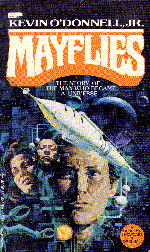|
Mayflies
Copyright 1979 by
I first read this on the 27th April 2002. Three hundred years in our future technology may have improved but people haven't. Society is even less stable than today. The US President, in a fit of depression rather than vision, commands the creation of a vast colony ship in a last ditch attempt to ensure that, when the crunch comes, some fragment of humanity will survive it. The massive ship is built in space. It's almost two kilometers long and a half wide. It's controlled by a state-of-the-art computer system commanding servos throughout the ship that will enable it to fully maintain itself, while at the same time, providing a high, indeed luxurious, level of service to the passengers. When full the ship will hold twenty-five thousand passengers for the century-long voyage to Canopus. For the passengers a mere fifteen years will pass before they set down on a virgin world to forge a new home. There's only two problems with this scenario. The passengers aren't all perhaps the best examples of human development to date. The government has taken this opportunity to unload some of its undesirables from Earth. Secondly, the requirements for the controlling computer are so strenuous that only a new kind of computer technology was determined to be capable of fulfilling them. The ship is to be controlled by a biological computer, based upon a human brain. However the voyage could still have been successful, were it not for the failure of the engines shortly after launch. Instead of the relatively short fifteen year sprint, the journey will now take several hundred years and generations will and die upon the ship as it slowly travels to Canopus. My problem was that I kept losing track of the current date. I liked the characters recurring through the generations. However, It's difficult to empathise with such "short-lived" characters and if one of these mayflies does manage to grab one's sympathy for a moment, it's just another thimbleful of those old heartbreak blues when they die of old age a few pages later. That O'Donnell managed to make me empathize with so many is a testament to his writing skill. But ultimately the story is only partly successful. Read this and enjoy it, but then read O'Donnell's "Ora:cle" and see how good he can really be. Loaded on the 2nd June 2002.
|
|




